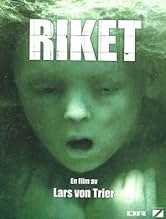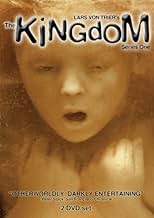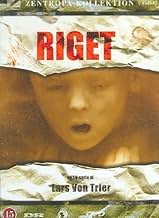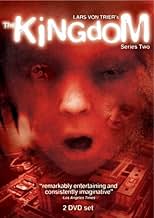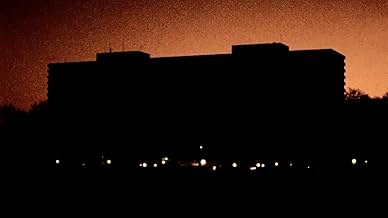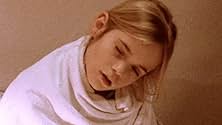Doctors at an ultramodern hospital in Denmark become convinced, by way of weird, inexplicable happenings, that the place is haunted.Doctors at an ultramodern hospital in Denmark become convinced, by way of weird, inexplicable happenings, that the place is haunted.Doctors at an ultramodern hospital in Denmark become convinced, by way of weird, inexplicable happenings, that the place is haunted.
- Awards
- 20 wins & 7 nominations
Browse episodes
Storyline
Did you know
- TriviaFor the German-speaking markets, 'Riget' was translated into 'Hospital der Geister - The Kingdom', as a direct translation, 'Das Reich', for obvious reasons was deemed inappropriate.
- GoofsHelmer procures hot coffee, and enters the archive. Mogge returns, with Krogshøj, and they lock Helmer in - he's left standing with a cup of scalding coffee - he can't move with setting off the infra-red alarm sensors. He's left, statue-like, staring at his cup of steaming liquid. Cut to Drusse and Bulder. She says she has to perform a seance for some doctors, and tells Bulder that in 1 hour, they are to attempt to enter the archive. When they get there, they inadvertently liberate Helmer, who casts away his cup of still scalding, yet hour-old coffee.
- Alternate versionsOriginally shown as a TV miniseries in 4 episodes. A slightly longer theatrical version was released abroad after the TV premiere.
- ConnectionsFeatured in I Lars von Triers rige - en mand og hans tv-serie (1994)
Featured review
I didn't like Riget I much. It was boring, and horror stories like that had been told a thousand times before. On the positive side, Stig Helmer was one of the most memorable characters ever, and he was even better than he was in the second series. Kudos to Jaregard for an outstanding interpretation. Also on the positive side, some things were funny (Helmer with the car rims) and some were genuinely absurd (where Krogshoj lives). But overall, Riget remained well inside the boundaries of the horror genre, and the narration didn't reach the critical point where everything becomes art.
Now Riget II, a masterpiece. The second series expresses all the unrealized potential of the first one. The tone is consistently grotesque, each action and interaction is quite absurd, and all the bonds with reality have been cut. There's no suspension of disbelief anymore, because everything is obviously surreal. Still, the audience is hooked till the end following a plot that is part crazy, part logical and compelling. There's much more humor and much more horror than there was in the first series, allowing the film to reach that critical point where contrast between tones and genres creates a rich canvas of relationships and meanings. You will smile at the electric car, believe the zombie poison, and listen to extremely deep pieces of philosophy by the dishwashers and Lars von Trier himself. The last scene with Little Brother is painful and hilarious at the same time, while flirting with a cosmological, universal, spiritual significance: hats off. You will also witness delightful, unbelievable situations, that make perfectly sense within the plot: this is a subtle form of art that started to reach its full potential in the nineties.
I watched Riget II before year 2000 for the first time, and then recently watched it again. At the time, I was quite shocked by its originality. Many things that von Trier did here spread around later in film making: I think this series was really ahead of the times. For example, I could not but notice the similarities between Riget II and "Arrested Development", the comedy series: camera work, editing, jumps between scenes and subplots, dry humor, over the top characters, lots of things were exactly the same. It's like Von Trier developed a language to imagine and handle absurd situations with ease; you can notice the obvious progress he made from Riget I to II.
Now Riget II, a masterpiece. The second series expresses all the unrealized potential of the first one. The tone is consistently grotesque, each action and interaction is quite absurd, and all the bonds with reality have been cut. There's no suspension of disbelief anymore, because everything is obviously surreal. Still, the audience is hooked till the end following a plot that is part crazy, part logical and compelling. There's much more humor and much more horror than there was in the first series, allowing the film to reach that critical point where contrast between tones and genres creates a rich canvas of relationships and meanings. You will smile at the electric car, believe the zombie poison, and listen to extremely deep pieces of philosophy by the dishwashers and Lars von Trier himself. The last scene with Little Brother is painful and hilarious at the same time, while flirting with a cosmological, universal, spiritual significance: hats off. You will also witness delightful, unbelievable situations, that make perfectly sense within the plot: this is a subtle form of art that started to reach its full potential in the nineties.
I watched Riget II before year 2000 for the first time, and then recently watched it again. At the time, I was quite shocked by its originality. Many things that von Trier did here spread around later in film making: I think this series was really ahead of the times. For example, I could not but notice the similarities between Riget II and "Arrested Development", the comedy series: camera work, editing, jumps between scenes and subplots, dry humor, over the top characters, lots of things were exactly the same. It's like Von Trier developed a language to imagine and handle absurd situations with ease; you can notice the obvious progress he made from Riget I to II.
- How many seasons does The Kingdom have?Powered by Alexa
Details
- Release date
- Countries of origin
- Languages
- Also known as
- The Kingdom II
- Filming locations
- Production companies
- See more company credits at IMDbPro
Contribute to this page
Suggest an edit or add missing content





